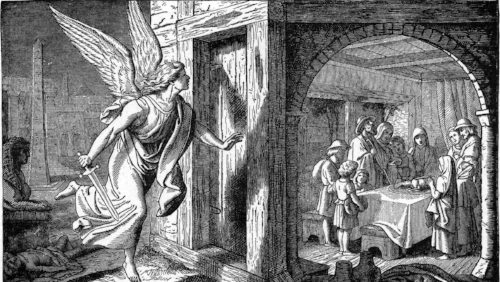"When I read this card I hear a guideline and see a lens through which to evaluate what I’m doing with my life, in a broad, whole picture view, or within a given, specific situation. It helps me make better decisions, informed by my choice to adhere to Jesus’ teachings to the best of my ability. I don’t do this out of a fear of Hell or destruction, but out of love for life – others’ as well as my own.
Special shit digging tools (Deuteronomy 23:12-13)
Thus saith the LORD:
You shall have a designated area outside the camp to which you shall go. With your utensils you shall have a trowel; when you relieve yourself outside, you shall dig a hole with it and then cover up your excrement. (Deuteronomy 23:12-13, New Revised Standard Version)
More than a picture of Hebrew sanitation practices on the battlefield, this passage provides a stunning insight into the mind of the Hebrew warrior, the crux of which is contained in the following verse:
Because the LORD your God travels along with your camp, to save you and to hand over your enemies to you, therefore your camp must be holy, so that he may not see anything indecent among you and turn away from you. (Deuteronomy 23:14, NRSV)
Simplified: Thus saith the Lord: “I don’t want to step in your shit.” No, really. Literally and metaphorically, God doesn’t want to step in our shit.
God was the head of the Hebrew army and no REMF. Throughout the Hebrew Bible the Divine Warrior rose from His southern stronghold to lead His people into battle: consider Exodus 15 , Deuteronomy 33 , Judges 5 , Psalm 68, and Habakkuk 3. This is why the people were admonished so often to not fear in battle: when they were told that YHWH will be with them, upholding them with a victorious right hand, that the enemy will cease to exist, that those who dare wage war against them will no longer be found on the earth (Isaiah 41:10-13 ), it was because God, literally, was on the battlefield kicking butts and taking names.
Now picture the average commanding officer striding through a war camp, inspecting the troops, and stepping a dusty open-toed sandal into a freshly minted, still steaming, lentil bean and corn strewn turd. That’s not going to end well for anyone. Not at all. And that was a mere mortal descending into defecation. Imagine it being God. But of course this verse is about more than avoiding the angelic scraping of scared sandals. As with most things in Deuteronomy this is about holiness. And as always, context is important.
Chapter 23 of Deuteronomy begins discussing people who were excluded from the holy assembly for ritual and cultic impurity: vs. 1 those with crushed testicles and severed penises [yes we have a card for this]; vs 2 certain types of bastards and their descendants; vs 3-8 addresses the Ammonite, Moabite, and Edomites because screw those Canaanites (however, you might also consider this perspective on that and/or this one as well.
From here the text moves to talk about waging war, describing how soldiers should act prior to battle: When you are encamped against your enemies you shall guard against any impropriety (vs 9). After covering what to do when a solider has had a wet dream (vs 10, and yes this is a card too), the fecal matter of the armed forces is next, because there is clearly a concern for what happens below the bellybutton, both front and back. The common link throughout these situations is holiness: in the socio-political assembly, in the Temple, and in the war camp, there are ways that the sacredness of the location is established and maintained. The rest of the chapter delineates social holiness: how to treat runaway slaves with grace and hospitality; rules against the exploitation of the daughters and sons of Israel as Temple prostitutes; prohibitions against loan sharking and usury within the community; and of course, fulfilling the vow to the Lord your God (vs 15-23). In other words, in all the places one would encounter God, holiness is expected.
Returning to our passage we see the potential arrival of God into the war camp: The Divine walking among the people, just like in Eden before the first couple stepped in a huge pile of their own making. This is significant. In the words of the renowned scholar the Gerhard Von Rad:
Israel knew that in these it was standing especially close and unprotected in Yahweh's field of operation. Therefore everything that was displeasing to Yahweh must be eliminated with more than usual care, that is to say, the camp must be ‘holy’. (Deuteronomy, 1966)
The Hebrews had an understanding of God walking in their midst.
Perhaps we should likewise take this mindset to heart.
Perhaps it’s not crazy to live life with the image of God walking beside us, through our days, decisions, and even defecations.
Perhaps we would be more careful to live lives of holiness in light of God having to watch where He steps.
But what do we know: we made this game and you probably think we’re going to Hell.



![O Come, O Come Emmanuel (Isaiah 7:14) [An Advent Card Talk]](https://images.squarespace-cdn.com/content/v1/55a9a1e3e4b069b20edab1b0/1483161046976-X5VJE3CMP9T957O72EII/3d-wallpapers-light-dark-wallpaper-35822.jpg)

![Wide and Narrow Gates (Matthew 7:13-14) [Guest Card Talk]](https://images.squarespace-cdn.com/content/v1/55a9a1e3e4b069b20edab1b0/1494213447072-GP9Q801E9JLH3V1OM731/image58.jpg)
